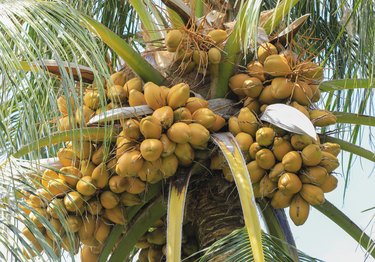
The silhouette of the coconut palm (Cocos nucifera) is iconic of the tropics, and the coconut fruit is used for cooking and for a variety of products, including cosmetics. The average height of a coconut tree is 80 to 100 feet tall, although some varieties may be shorter. Coconut palm trees grow in U.S. Department of Agriculture plant hardiness zones 10 to 12.
Coconut Palm Description
Video of the Day
The coconut palm has a tall trunk that is smooth and grayish-brown in color. The trunk may be straight or curved depending on the cultivar. At the top of the trunk, the palm has large green leaves that grow up to 18 feet long. The leaves are feather-shaped and are up to 4 feet wide.
Video of the Day
Young palms don't flower until they reach about four to six years of age. Then, they produce yellow blooms. The female flowers are larger than the male flowers. Fertilized flowers develop into fruits. Coconuts are quite large, measuring up to 15 inches long. These large fruits can pose a danger to anyone underneath the tree when the fruit falls up to 100 feet.
A thick husk protects the nut inside. The nut contains white flesh, or coconut meat, and coconut milk filling some of the hollow center. Fruits are yellow or green in color and turn brown when they mature.
Coconut Palm Growing Conditions
Coconut palm trees prefer tropical climates. They like plenty of rainfall but need well-drained soil where the moisture won't accumulate and puddle around the roots. These soggy conditions can only be tolerated for a couple of days before the tree starts to suffer. The palm is drought-tolerant, but a lack of moisture will decrease coconut yield.
The plants prefer full sun, which isn't much of a concern when they get closer to their full height. Coconut palms are long-lived plants. They start producing fruit when they are six to 10 years old and continue to fruit until they are about 80. The tree produces fruits throughout the year, and it takes about a year for each coconut to fully mature.
The coconut palm is tolerant of salt and wind but is easily damaged by cold. Temperatures below 40 degrees Fahrenheit may cause injury, and temperatures below freezing may cause palm death.
Coconut Products and Uses
The coconut palm and its fruits have a wide range of uses. The fruits are nutritious, and the meat can be used in baking and other recipes. Coconut milk and coconut oil are also commonly used in the kitchen. Coconut oil is another common ingredient in coconut products like cosmetics, candles, lotions and soaps.
The shell of the fruit makes a good bowl, and the husk of the fruit can be processed into a material used to make rope. They also make an effective mulch to maintain soil moisture and suppress weeds or can be a peat alternative in compost.
The trunk and leaves also have traditional uses. The trunk can be used as timber for building structures, while the leaves make thatch for roofs. The trunk can also be used for other projects, such as furniture making. Leaves can also be used as a broom.